2024 marks the 150th anniversary of Gustav Holst, born in Cheltenham on 21 September 1874. He devoted his life to teaching and composition, crafting nearly 300 works in a variety of genres including orchestral music, chamber music, brass and military band, opera, works for chorus with orchestra, lighter accompaniment or a cappella, carols, sacred music, hymns, organ music, part-songs and songs for voice and piano.

Statue of Gustav Holst in Cheltenham
Holst is primarily remembered, including by listeners with little or no connections to classical music, for The Planets. This musical journey across the planets of the Solar System initially received some hostile reviews, calling it “a great disappointment… elaborately contrived and painful to hear.” Yet, a mere 15 years later it was considered “Holst’s greatest work.” It has been recorded countless times, and it easily crossed into the popular realm and into the world of advertising.
Gustav Holst: The Planets, “Mars”
In Transition
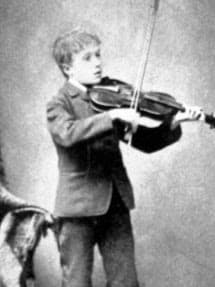
Gustav Holst as a boy
Gustav Holst was a highly important transitional figure, as his career overlapped the musical and social worlds of both the 19th and 20th centuries. He came from a family of professional musicians “serving the leisured classes of Victorian England,” and he died when technological innovations brought art music to all levels of society.
Traumatic events and social changes took place during his lifetime, and as Michael Short writes, “had an inevitable effect on the arts, and the activities of radical composers called into question previous conceptions of what music should be like and what function it should perform in society. In fact, the rise of recording and broadcasting changed the face of music-making forever.”
Gustav Holst: 3 Pieces, Op. 2 (Sarah Francis, oboe; English String Quartet)
The Composer
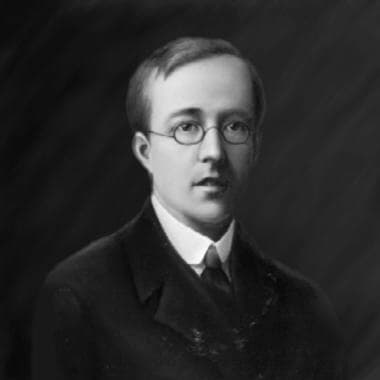
The young Gustav Holst
Holst is an enigmatic composer, who basically found his own way. He strongly believed in music as a means of human communication, and according to Ralph Vaughan Williams, “he loved his fellow creatures too much to allow his message to them to appear in vague or incomprehensible terms.” The essence of Holst’s message was the expression of emotion, which he declared “the fundamental necessity of all art.” As he famously declared, “Musicians express in sound what all men feel.”
Holst was largely self-taught as a composer, even though he received some initial training at the Royal College of Music. He greatly disliked academic theories of composition, and was constantly searching for, what he called, “the right notes.” His attempts were occasionally successful, but failed miserable at times. As Holst said, “every composer must be prepared to turn out a lot of stuff which isn’t really of any value.”
Gustav Holst: The Cloud Messenger, Op. 30 (Della Jones, mezzo-soprano; London Symphony Chorus; London Symphony Orchestra; Richard Hickox, cond.)
Musical Language
In terms of musical language, as Holst gradually freed himself from the influence of Richard Wager, his unconventional syntax became more angular and contrapuntal. And his use of modality, as Colin Matthews observed, “is very different from that of other English composers, having more in common with Hindemith.” Holst hated to theorise about music, suggesting that “a composer is usually quite unconscious of what is going on.” Holst revealed very little about his own technique of composition.
Always willing to try something new, his motto apparently was “do something you have never done before.” And although he was pleased when his music was performed and appreciated, he never went out of his way to attract public attention. As Michael Short writes, “In fact, Holst went to the opposite extreme in declaring that failure, rather than success, was the best thing for an artist.” As Holst wrote to a student, “Failure is a most important part of an artist’s training and one you cannot afford to do without.”
Gustav Holst: Beni Mora Suite
Genuine Individual
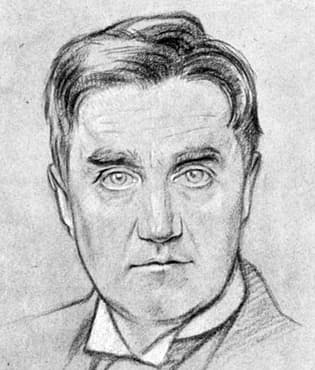
Ralph Vaughan Williams
Holst is not considered a great musical innovator, but as Colin Matthews wrote, “the rhythmic impetus behind much of his music, and his use of unconventional time signatures combined with cross-and permutated rhythms probably derived from the English madrigalists, mark him out as a genuine individual.” In his early works, Holst had used extensive chromaticism, but as time went on, he stayed firmly wed to tonality.
His melodies are marked by a preference for fourths and fifths, and ostinato, along with rising and falling scale patterns, were an important aspect of his musical armoury. “His harmonic originality,” as scholars have observed, “is owed to a subtle use of bitonality and occasional polytonality. He was a master of writing counterpoint in several different keys, and he stated that his “technique was something quite apart from the hits and squashes of conventional modern harmony.”
Gustav Holst: Savitri, Op. 25 (Janet Baker, mezzo-soprano; Robert Tear, tenor; Thomas Hemsley, baritone; English Chamber Orchestra; Imogen Holst, cond.)
The Teacher
In terms of didactic activities, Holst is probably best known as director of music at St Paul’s Girls’ School in Hammersmith from 1905 until his death, and as director of music at Morley College from 1907 to 1924. Holst is described as an outstanding teacher who almost exclusively worked with children and amateurs. Philippa Tudor has extensively researched this previously unexplored aspect of Holst’s life, and uncovered a treasure trove of unknown correspondence.
The Holst student William Probert-Jones remembered, “His teaching was of such a personal and intimate character that any cold-blooded account of his method would give an entirely wrong impression… there was nothing set or formal in his way of teaching, what he set out to do was to draw out of his students all that was best in them by any means in power, and most perhaps by making them learn by doing. He was curious blend of visionary and the practical.”
Gustav Holst: Suite No. 1 in E-flat Major, Op. 28, No. 1 (Central Band of the Royal Air Force; Duncan Stubbs, cond.)
Love
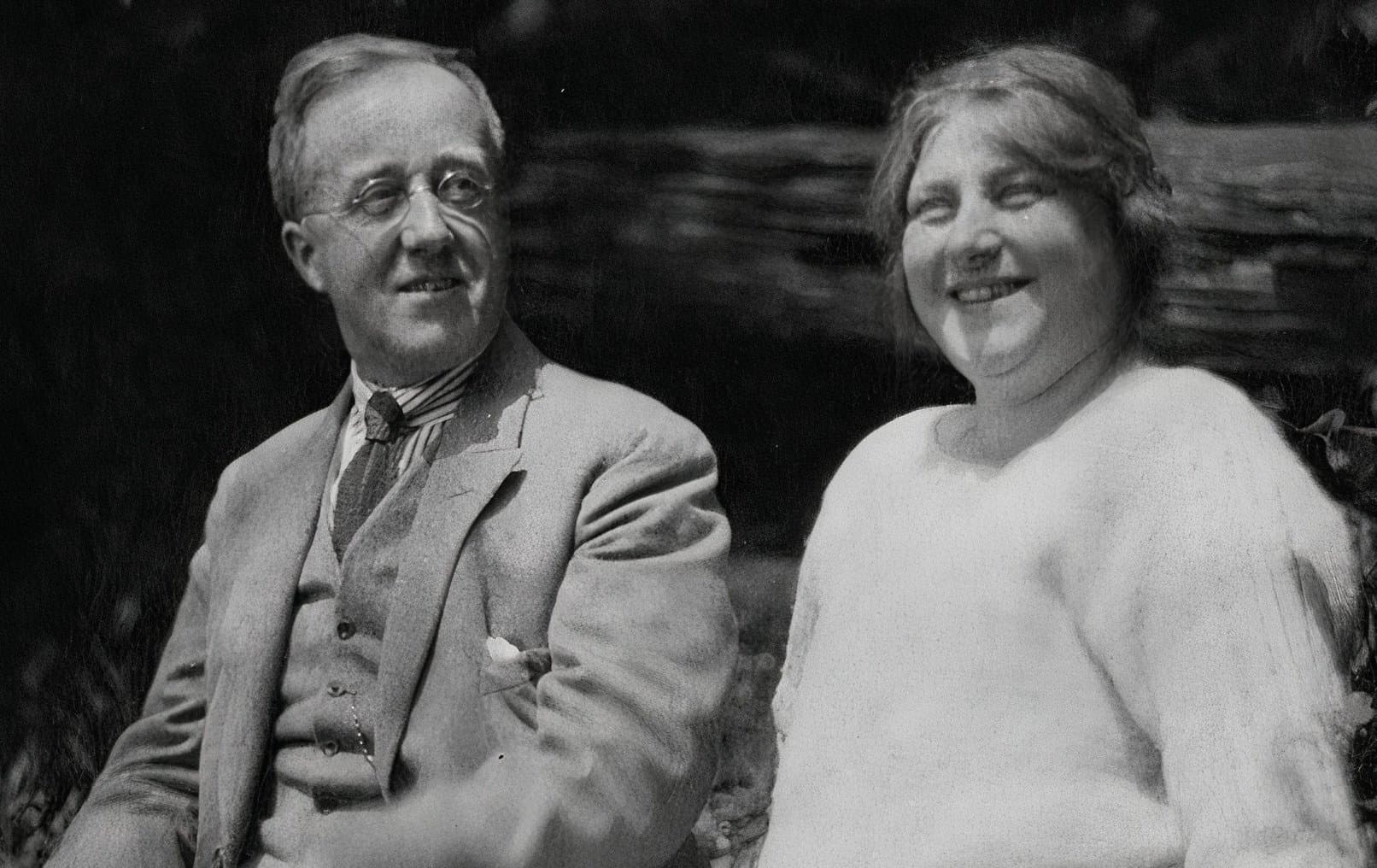
Gustav and Isobel Holst
Gustav Holst met Ralph Vaughan Williams for the first time in 1895. They soon were in the habit of playing their compositions to each other, and would discuss poetry of Walt Whitman or the socialist works of William Morris. Holst joined the Hammersmith Socialist Club, and he conducted the Hammersmith Socialist Choir at William Morris’ house. And there he met Isobel Harrison, described as “a pretty blue-eyed blonde and an able soprano.” As nature took its course, Holst was soon madly in love.
Isobel Harrison grew up in North London, daughter of a Merchant’s Clerk, and initially, she wasn’t particularly impressed by the attention. Holst’s physical appearance at that time was described as “thin and anaemic, yet his movements were quick and he walked in long energetic strides.” He frequently cycled with his trombone strapped over his back, and eventually she convinced him to improve his sense of dress and persuaded him to eat properly. They married in 1901, bringing “grace and ease and comfort” into his life.
Gustav Holst: Invocation, Op. 19, No. 2 (Guy Johnston, cello; BBC Philharmonic Orchestra; Andrew Davis, cond.)
Personality
Holst was described “at once friendly, gregarious, jolly, and rumbustious, but at the same time solitary, remote, and seemingly aloof.” It seems a remarkable combination of opposing characteristics, one that appreciated human interaction and simultaneously, mystical speculation. And while he could be quite business-like at times, Holst was “often quite naïve in his attitudes towards life and his music.”
Seemingly, Holst was a dreamer and a visionary, as the schoolmaster was also a restless and introspective artist. With his interest in Far-Eastern philosophies, Holst searched for answers beyond the physical world, and he brought the same degree of artistic concentration and integrity to all his compositions. Ralph Vaughan Williams said, “There was no compromise about Holst, either in his music or in his character. He was thorough, he did not know what it was to do things by half.”
Gustav Holst: Egdon Heath (BBC Symphony Orchestra; Andrew Davis, cond.)
Conclusion
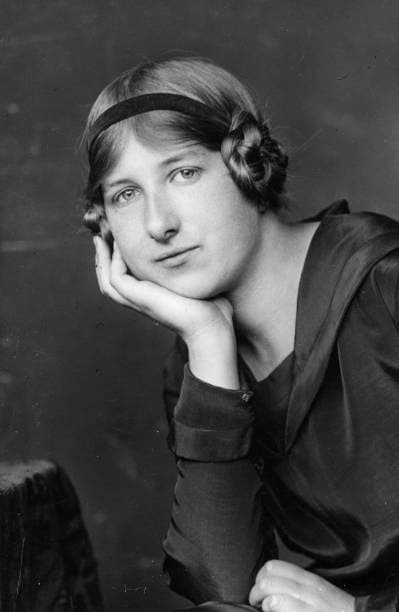
Imogen Holst
In his personal synthesis of disparate elements, Holst created music of distinctive originality with an inspiring visionary quality. Scholars perceive a strange lack of consistency in Holst’s music, “which stems not from any lack of technical proficiency – even his earliest works reveal a thorough facility – but rather from an almost stubborn desire to be unpredictable.”
His daughter Imogen Holst frequently described the often disconcertingly laconic nature of his musical language: “as soon as he had made his point, he stopped.” And the composer himself added, “the fact is, I don’t like any music very much if it is highly polished and sounds fluent. I like to have a sense of struggle which an artist has had with his materials.” As we say Happy Birthday to Gustav Holst, we recognise him as probably the most individual composer among his English contemporaries.
For more of the best in classical music, sign up for our E-Newsletter
